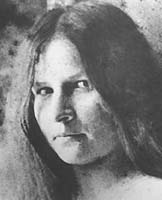Trakl, Margarethe
(8/8/891, Salzburg - 9/23/1917, Berlin)
Called Grete or Gretl, was the youngest of six children from the marriage of Tobias and Maria Catherina Trakl. The physical and psychological similarities between Gretl and her brother, four and a half years older, were noticeable. The mysteries around the mental and erotic decline that evolved between the two will never be fully understood because their letters to each other have not been found, probably because the family sought them out to destroy.
Grete is described by those who knew her as unusually vital, passionate, sensual and untamable, paired with a large artistic talent, particularly in music.
Like her older sisters she lives more frequently outside the house, starting at age eleven, enduring skillfully at boarding schools in St. Pölten and Vienna. In the fall of 1908, she studied piano at the Viennese music academy, paralleling Georg's pharmacy studies at the University of Vienna. They lived separately. Her tendencies toward excessiveness and immoderation were accentuated by the world of drug abuse she was introduced to by Georg.
After the death of her father in 1910, she moved to Berlin to continue her piano training with Ernst von Dohnányi.
In 1912, Georg took over partial guardianship from his oldest brother Wilhelm.
After passing to Georg, Gretl could carry out the July 17, 1912 marriage to a Berlin bookseller and theater employee, thirty-four years her elder.
From now on she had contacts to the organ of literary expressionism, “The Storm”, whose coworkers communicated with Ludwig von Ficker and Georg's publisher Kurt Wolff. In 1913, she is rumored to have had a short affair with Erhard Buschbeck, which may explain why Trakl broke off contact with him.
In March 1914, he visited Grete, who was recovering from an abortion, in Berlin.
On October 27, 1914, shortly before his death, Trakl bequeathed all his worldly belongings to her in a letter to Ficker, including Wittgenstein's donation of twenty thousand crowns. Even with this support, an inexorable fall began for Grete. She could not resuscitate her career as a pianist. Her husband left her. She plunged ever deeper into the world of drugs.
On September 23, 1917 after a party, she shot herself in Berlin.
